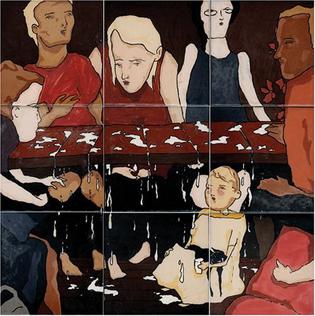Mogwai had humble beginnings in Glasgow, Scotland. Stuart Braithwaite, Dominic Aitchson, and Martin Bulloch came together to form the start of Mogwai in 1995. After the release of their first two albums, Mogwai Young Team and Come On Die Young, the band really began to work towards the spacious, "post-rock" sound that they became known for (although to this day, they despise the term). With Rock Action, the band started really pushing their name out, and the subsequent album, Happy Songs for Happy People, was their first album to garner some album sales in the US, which was impressive for a little post-rock band from Glasgow.
Now, they're a huge band with a constantly changing sound. Hardcore Will Never Die, But You Will was a major progression from the previous album, The Hawk Is Howling, which again, was a progression from Mr. Beast. But the Earth Division EP of last year was the most radically different thing Mogwai has ever done, and the new sound is a drastic shift from Hardcore. It really begs the question, "Where is Braithwaite taking Mogwai, and will the fans be able to follow?" But then, one remembers that Mogwai isn't really post-rock. No, the shrugging off of the term somewhat lessens the intensity of the approach the listener must take when thinking about Mogwai's music. Post-rock implies a conscious recognition of what one is doing all of the time. When the band creates music, they go with where the music takes them. And that's what sets Mogwai apart from a slough of other instrumental bands competing for your attention, gentle reader.
Is Mogwai changing? Yes. Is it a bad thing? It depends. Should you still listen to them? Absolutely. Many things we had once thought were concrete are now no more solid than the slowly dissipating polar ice caps, or the sweet, fading echoes of synthesizers ringing softly in my Audio Technica cans at 4 a.m. The one thing we can do, reader, is treasure what we have, and look forward to what will come. Mogwai may change, but embracing the change and the artistic integrity of the band is what's important, just as embracing what may come politically, socially, or psychologically. If you're ready for what may come, nothing will surprise you. You'll be ready for anything and everything. You'll be fine.
RECOMMENDED ALBUM
Mr. Beast (2006)
This album is sophistication. It's classy. It's glitzy. And yet, it's somehow so relevant and humble at the same time that it really deserves mention. Mr. Beast is what Martin Bulloch said was "probably Mogwai's best album since Young Team." I have to agree. It's a really fantastic album, with a lot to love, from opener "Auto Rock," heavy hitter "Glasgow Mega-Snake," art-rock classic "Friend of the Night" and incredible masterpiece "I Chose Horses." This album spotlights on a lot of what Mogwai used to be, with powerful choruses and a bit of a larger focus on electronic instruments. Mr. Beast is a fine summation of why I love Mogwai's music, and while it may not be the most highly recommended or remembered of albums, it definitely deserves a listen. Or four. Or seven. Thousand.
This album is sophistication. It's classy. It's glitzy. And yet, it's somehow so relevant and humble at the same time that it really deserves mention. Mr. Beast is what Martin Bulloch said was "probably Mogwai's best album since Young Team." I have to agree. It's a really fantastic album, with a lot to love, from opener "Auto Rock," heavy hitter "Glasgow Mega-Snake," art-rock classic "Friend of the Night" and incredible masterpiece "I Chose Horses." This album spotlights on a lot of what Mogwai used to be, with powerful choruses and a bit of a larger focus on electronic instruments. Mr. Beast is a fine summation of why I love Mogwai's music, and while it may not be the most highly recommended or remembered of albums, it definitely deserves a listen. Or four. Or seven. Thousand.










No comments:
Post a Comment